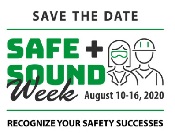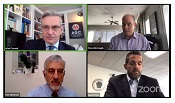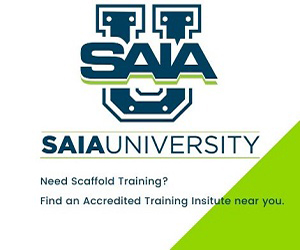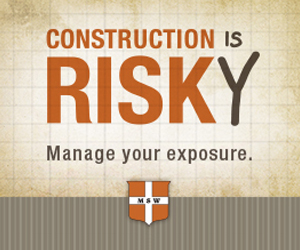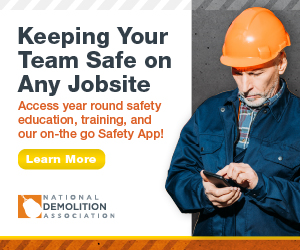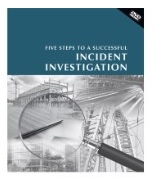 |
||||||||||||||||
| Archive | Subscribe | Safety and Health | Constructor Buyers' Guide | ||||||||||||||||
|
Top News
July 14 – 16, 2020
AGC’s Construction Safety, Health & Environmental Conference provides a forum for hundreds of construction professionals to stay connected and learn from their peers and industry experts. During these unprecedented times, AGC is excited to be able to provide attendees with a safe, online environment to continue this tradtion.
• Attendees will be able to connect with each other via a chat feature in the online platform
• Speakers will be presenting live and you will have the opportunity to have your questions answered in real-time
• Our industry partners will deliver informative and interactive industry briefings and will be available to answer your questions throughout the event
• Pre/post conference peer-to-peer roundtable discussions on issues directly affecting your day to day responsibilities
Browse the lineup of sessions for this year and register today.
August 10-16, 2020
Safe + Sound Week is a nationwide event held each August that recognizes the successes of workplace safety and health programs and offers information and ideas on how to keep America's workers safe.
Why Participate?
Successful safety and health programs can proactively identify and manage workplace hazards before they cause injury or illness, improving sustainability and the bottom line. Participating in Safe + Sound Week can help get your program started, energize an existing one, or provide a chance to recognize your safety successes. Who Participates?
All organizations looking for an opportunity to recognize their commitment to safety are welcome to participate. Last year, more than 2,700 businesses helped to raise awareness about workers' health and safety!
On June 24, 2020, Safety Week Chair Scott Cassels and Co-Chair Mike McKelvy released the following announcement:
Please mark your calendars on Sept. 14-18, 2020 for our rescheduled dates for Construction Safety Week.
We are excited to get Construction Safety Week rescheduled (September 14-18, 2020) and believe now more than ever it’s important to recommit to our safety fundamentals that have allowed our industry to be Built on Safety.
As we finish developing a revised Safety Week 2020 plan, it will certainly be different than past years to allow for proper COVID-19 protocols. Although we may need to alter our safety meetings and recognition events, we will still find and promote effective ways to meet and recommit to sending every person home safely from our job sites each day. Our focus will be on our theme — Built on Safety — and our foundational tools, education and processes to ensure all the men and women who work in our industry are safe.
In the coming weeks, we will share new recommendations and resources with you to outline ways we can all plan for Construction Safety Week on Sept. 14-18, 2020. This will include a recommended topic for each day along with ideas for communicating and discussing each topic.
Construction employment increased in 329 out of 358 metro areas between April and May as a new survey finds that two-thirds of highway construction firms had at least one crash in the past year at highway work zones they operate. Officials with AGC of America and HCSS, which conducted the survey, urged drivers to slow down and be aware while driving through highway work zones during their summer travels.
“As industry employment increases, it is safe to assume that more people are working in highway work zones that are typically close to moving traffic,” said Ken Simonson, the association’s chief economist. “And it is important to remember that any time your job site is just a few feet away from fast moving traffic, danger is never far away.”
AGC is requesting presentation proposals covering construction safety and health issues as well as those cross-over topics that would appeal to a broader audience of Safety, Health & Environmental (SH&E) professionals; for example leadership, management, training, general technologies, or risk and crisis management that use a mix of safety and health and environmental examples. The conferences address the most critical safety and health issues impacting the business of construction, provides management guidance for professionals, and gives context for other construction professionals looking to understand the key concepts and round out their knowledge.
For more information on speaker expectations, important deadlines, and how to submit your proposal, click here.
Regulatory & Legislative Updates
Throughout much of the U.S., high temperatures and humidity in the summer season can create hot and hazardous working conditions, both outdoors and indoors. The U.S. Department of Labor’s Occupational Safety and Health Administration (OSHA) reminds employers of their duty to protect employees from the risks and dangers of heat exposure. OSHA reminds employers of the following ways to mitigate heat hazards:
Events
According to the Bureau of Labor Statistics (BLS), from 2011 to 2015, the Census of Fatal Occupational Injuries (CFOI) reported 220 total crane-related deaths, an average of 44 per year over this 5-year period with 42% of the fatal work injuries taking place in the private construction industry. The data also shows that specialty contractors and heavy and civil engineering construction accounted for the most fatalities involving cranes in private construction. AGC of America is pleased to offer this one-day training program based on OSHA standards and best practices to answer the need for quality training within the industry. September dates September 16 & 17, 2020 | 8:00 a.m. - 5:00 p.m.
October 5 – 7, 2020 | Cincinnati, OH
Early-bird Registration Rate: $895 (until 07/08/20)
Standard Registration Rate: $995 (after 07/08/20)
The AGC Safety Management Training Course (SMTC) provides attendees three days of training on the basic skills needed to manage a company safety program in the construction industry. Held just a few times per year at select locations around the country, the SMTC program builds on focus four training and prepares attendees to manage key safety issues on the job site and provides techniques for delivering basic safety training to field personnel. Participants will receive intensive instruction and training that will allow them to return to their firms with readily applicable new skills to positively impact their company’s safety and health program.
Safety Cabinet
Companies need guidance on how to investigate a job site accident properly. This program helps you better prepare contractors for investigating accidents on their jobsite, including root cause analysis. Accidents occur on construction jobsites every day. The failure of people, equipment, supplies, or surroundings causes most of them. Incident investigations determine how and why these failures occur. By using the information gained through an investigation, a similar, or perhaps more disastrous, accident may be prevented. It is important to conduct incident investigations with prevention in mind and not blame. Package includes a twenty-two minute DVD video and one booklet. This video is now available for licensing. If interested, please contact Marketing Manager, Laura Alcocer at laura.alcocer@agc.org.
Best Practices
Strategies to resume "normal" operations post-COVID-19
After months of managing an ever-changing landscape of operational mandates related to working or not working during the coronavirus pandemic, enabling office-based staff to work remotely and adopting technology that supports social distancing requirements, construction companies are looking carefully at how to return to work as restrictions ease.
BY SHERYL S. JACKSON
GPOINTSTUDIO/SHUTTERSTOCK.COM
|
||||||||||||||||


